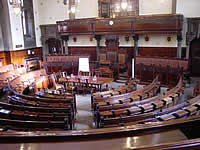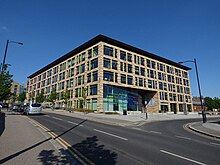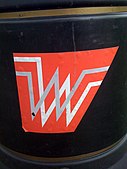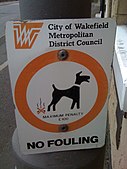Wakefield Council
Wakefield Council | |
|---|---|
| Third of council elected three years out of four | |
 | |
Council logo | |
| Type | |
| Type | |
| Leadership | |
Andrew Balchin since 2020[3] | |
| Structure | |
| Seats | 63 councillors |
 | |
Political groups |
|
Joint committees | West Yorkshire Combined Authority |
| Elections | |
| Multiple member first-past-the-post voting | |
Last election | 2 May 2024 |
Next election | 7 May 2026 |
| Motto | |
| Persevere and prosper | |
| Meeting place | |
 | |
| County Hall, Bond Street, Wakefield, WF1 2QW | |
| Website | |
| www | |
Wakefield Council, also known as the City of Wakefield Metropolitan District Council, is the local authority of the City of Wakefield in West Yorkshire, England. Wakefield has had a council since 1848, which has been reformed on several occasions. Since 1974 it has been a metropolitan borough council. It provides the majority of local government services in the city. The council has been a member of the West Yorkshire Combined Authority since 2014.
The council has been under Labour majority control since the 1974 reforms. It meets at County Hall and has its main offices at Wakefield One.
History
[edit]The town of Wakefield had been an ancient borough, with its earliest known charter granted c. 1190. It lost its borough status c. 1580, after which it was governed by its manorial courts and vestry.[4]

A Wakefield parliamentary borough (constituency) was created in 1832.[5] In 1848 the town was also incorporated as a municipal borough, after which it was governed by a body formally called the "mayor, aldermen and burgesses of the borough of Wakefield", generally known as the corporation or town council.[6]
Wakefield was awarded city status in 1888, after which the corporation was also known as the city council.[7] In 1915, Wakefield raised to the status of a county borough, taking on the county-level services previously provided in the city by West Riding County Council.[6]
The larger metropolitan district of Wakefield and its council were created on 1 April 1974 under the Local Government Act 1972. It covered the whole area of eleven former districts and parts of another two, which were all abolished at the same time:[8][9]
- Castleford Municipal Borough
- Featherstone Urban District
- Hemsworth Rural District (part)
- Hemsworth Urban District
- Horbury Urban District
- Knottingley Urban District
- Normanton Urban District
- Osgoldcross Rural District (parishes of Darrington and East Hardwick only)
- Ossett Municipal Borough
- Pontefract Municipal Borough
- Stanley Urban District
- Wakefield County Borough
- Wakefield Rural District
The new Wakefield district was awarded borough status from its creation, allowing the chair of the council to take the title of mayor, continuing Wakefield's series of mayors dating back to 1848.[10] Wakefield's city status was extended to cover the whole of the new borough.[11] As such the council could call itself "Wakefield City Council", which name is sometimes used for it in official documents and the media.[12][13][14] The council now styles itself "Wakefield Council", having previously used the branding "City of Wakefield Metropolitan District Council".[15]
From 1974 until 1986 Wakefield was a district-level authority, with West Yorkshire County Council providing county-level services. The metropolitan county councils, including West Yorkshire County Council, were abolished in 1986 under the Local Government Act 1985. Since 1986 Wakefield Council has therefore been responsible for most local government functions.[16]
In 2004 the district's council housing was transferred to Wakefield and District Housing (WDH), a new independent housing association. Council houses account for around 30% of the district's housing.
The council has been a constituent member of the West Yorkshire Combined Authority since 2014, which has been led by the directly elected Mayor of West Yorkshire since 2021.[17]
Governance
[edit]
The local authority derives its powers and functions from the Local Government Act 1972 and subsequent legislation. For the purposes of local government, Wakefield is within a metropolitan area of England. As a metropolitan district council, Wakefield Metropolitan District Council provides most local government functions directly, including collecting Council Tax and business rates, town planning, housing, waste collection and environmental health, social services, libraries and waste disposal. It is also a local education authority. Wakefield Council is the billing authority for Council Tax, and collects precepts on behalf of the West Yorkshire Police and Crime Commissioner and the West Yorkshire Fire and Civil Defence Authority.
Certain services are provided with the other local authorities in West Yorkshire. The council is represented on West Yorkshire Joint Services Committee (for trading standards, archives, archaeology and grants), West Yorkshire Fire and Civil Defence Authority, West Yorkshire Integrated Transport Authority and the West Yorkshire Police and Crime Panel.[18] Wakefield Council has been a constituent member of the West Yorkshire Combined Authority since 2014.
Political control
[edit]The first election to the reconstituted council was held in 1973, initially operating as a shadow authority alongside the outgoing authorities until the new arrangements came into effect on 1 April 1974. Labour has held a majority of the seats on the council since 1974:[19][20]
| Party in control | Years | |
|---|---|---|
| Labour | 1974–present | |
Leadership
[edit]The role of mayor is largely ceremonial in Wakefield. Political leadership is instead provided by the leader of the council. The leaders since 1998 have been:[21]
| Councillor | Party | From | To | |
|---|---|---|---|---|
| Colin Croxall | Labour | 1998 | ||
| Peter Box | Labour | 1998 | 30 Nov 2019 | |
| Denise Jeffery | Labour | 1 Dec 2019 | ||
Composition
[edit]Following the 2024 election, the composition of the council was:[22]
| Party | Councillors | |
|---|---|---|
| Labour | 56 | |
| Conservative | 3 | |
| Liberal Democrats | 3 | |
| Independent | 1 | |
| Total | 63 | |
The independent sits in a group with two of the Conservatives. The other Conservative has opted not to sit in her party's group.[23] The next election is due in May 2026.
Premises
[edit]
The council meets at County Hall on Bond Street in Wakefield. The building was completed in 1898 as the headquarters of the former West Riding County Council, and subsequently served as the headquarters of West Yorkshire County Council between 1974 and 1986. Following the abolition of West Yorkshire County Council in 1986 the building was acquired by Wakefield Council. County Hall is a Grade I listed building.[24]
The council has its main offices and customer services centre in the nearby Wakefield One building on Burton Street, which was completed in 2012 and also houses the city's main library.[25][26]
Wakefield Town Hall on Wood Street is also used for some meetings and offices.[27] It was completed in 1880 and served as the main headquarters of Wakefield's council through its various iterations until the modern council's acquisition of County Hall in 1987.[28][29]
Elections
[edit]Since the last boundary changes in 2004 the council has comprised 63 councillors representing 21 wards, with each ward electing three councillors. Elections are held in three out of every four years, with a third of the council (one councillor for each ward) elected at a time for a four-year term.[30]
|
|
|
Former logos
[edit]References
[edit]- ^ Gardner, Tony (27 May 2024). "Meet the new 'calm and strong' Mayor of Wakefield known for his 'wicked sense of humour'". Wakefield Express. Retrieved 22 June 2024.
- ^ "Council minutes, 16 October 2019" (PDF). Wakefield Council. Retrieved 20 June 2023.
- ^ "Wakefield Council confirms Andrew Balchin as new chief executive". Wakefield Express. 17 December 2020. Retrieved 28 January 2021.
- ^ Goodchild, John (May 2011). "An outline history of Wakefield". Wakefield Historical Society. Retrieved 23 June 2024.
- ^ Parliamentary Boundaries Act. 1832. p. 368. Retrieved 23 June 2024.
- ^ a b "Wakefield Municipal Borough / County Borough". A Vision of Britain through Time. GB Historical GIS / University of Portsmouth. Retrieved 23 June 2024.
- ^ "No. 25837". The London Gazette. 13 July 1888. p. 3826.
- ^ "Local Government Act 1972", legislation.gov.uk, The National Archives, 1972 c. 70, retrieved 18 June 2023
- ^ "The Metropolitan Districts (Names) Order 1973", legislation.gov.uk, The National Archives, SI 1973/137, retrieved 18 June 2023
- ^ "District Councils and Boroughs". Parliamentary Debates (Hansard). 28 March 1974. Retrieved 16 January 2012.
- ^ "No. 46303". The London Gazette. 31 May 1974. p. 6486.
- ^ "The Whole of Government Accounts (Designation of Bodies) Order 2023", legislation.gov.uk, The National Archives, SI 2023/1016, retrieved 23 June 2024
- ^ "No. 48454". The London Gazette. 16 December 1980. p. 17420.
- ^ "Council drops Wakefield shopping centre buyout over cash fears". BBC News. 13 December 2022. Retrieved 23 June 2024.
- ^ "City of Wakefield Metropolitan District Council". Archived from the original on 3 February 2003. Retrieved 23 June 2024.
- ^ "Local Government Act 1985", legislation.gov.uk, The National Archives, 1985 c. 51, retrieved 18 June 2023
- ^ "The West Yorkshire Combined Authority Order 2014". www.legislation.gov.uk.
- ^ "Constitution" (PDF).
- ^ "Compositions calculator". The Elections Centre. Retrieved 10 August 2022.
- ^ "Wakefield". BBC News Online. 19 April 2008. Retrieved 3 December 2009.
- ^ "Council minutes". Wakefield Council. Retrieved 12 August 2022.
- ^ "Local elections 2024: full mayoral and council results for England". The Guardian. 4 May 2024. Retrieved 21 May 2024.
- ^ Gardner, Tony (25 May 2024). "Wakefield Mayor opts for new Tory-Independent coalition to break deadlock in 'unprecedented' opposition vote". Wakefield Express. Retrieved 22 June 2024.
- ^ Historic England. "County Hall (offices of West Yorkshire County Council), Bond Street, Wakefield (1242349)". National Heritage List for England. Retrieved 13 August 2019.
- ^ "Contact us". Wakefield Council. Retrieved 20 June 2023.
- ^ Spereall, David (15 October 2019). "Wakefield One council office could become 'smart' building with new sensors". Wakefield Express. Retrieved 20 June 2023.
- ^ "Calendar". Wakefield Council. Retrieved 23 June 2024.
- ^ Historic England. "Town Hall, Wood Street (Grade I) (1258995)". National Heritage List for England.
- ^ Gardner, Tony (5 October 2022). "Wakefield Council to shut historic County Hall headquarters blaming soaring energy costs". Wakefield Express. Retrieved 23 June 2024.
- ^ "The City of Wakefield (Electoral Changes) Order 2003", legislation.gov.uk, The National Archives, SI 2003/3087, retrieved 20 June 2023




